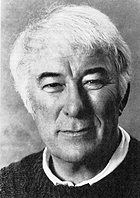|
DIGGING Between my finger and my thumb
http://www.poemhunter.com/p/m/poem.asp?poet=6714&poem=33129, visited |
|
The
title of the poem I’m about to analyse is a word reflecting a past labour, and
it probably suggests that the poem will be going to deal with the agricultural
or farm work. But the author is going further, he is
talking about that but as part of his memories. He is remembering the image of
his father and his grandfather working on the fields comparing it, in a hidden
way, with his own work, as I noticed in the first reading.
The
structure of the poem doesn’t follow a pattern. It has eight stanzas and they
vary between two and eight lines, and this probably brings some information
forward. The possible information that his past, his memories are not common,
they don’t follow an established pattern.
In
the first stanza (just composed by two lines), it may be a confusion, where he
says: “The squat pen rests; as snug as a gun”. We have to take into
account that he was born in a farm in Castledawson,
Now
he begins to remember the image of his father in the second stanza: “Under
my window a clean rasping sound/ When the spade sinks into gravelly
ground:/ My father, digging.
I look down”. We can see that the three last words of each line end with
the same sound: sound, ground, down, and if somebody reads the poem aloud, this
stanza seemed to be a song because of this repetition. This way of making a
repetition to seem like a song is a good way to make easier to remember what he
is saying. The last part of the last sentence: “I look down”, could be
as a regret, because he has not followed in his
father’s footsteps.
The
next stanza is like a technical explanation of the labour of a digger: “The
coarse boot nestled on the lug, the shaft/ Against the inside knee was levered
firmly./ He rooted out tall tops, buried the bright
edge deep”. Irishmen are well known for digging, but Heaney shows the skill
and dignity in their labour. “By God, the old man could handle a spade,/ Just like his old man.” Here is highlighting the
“dignity” of his father through a colloquial expression because in the present
he is old but he can “handle a spade” yet. And in the second line, he is
introducing a new figure, the figure of his grandfather.
The
way he introduces his grandfather to us is more exaggerated than in the case of
his father: “My grandfather could cut more turf in a day/ Than
any other man on Toner's bog.” But I don’t think he is giving more
importance to his grandfather than his father.
The
last but one stanza is more or less a conclusion: “The cold smell of potato mold, the squelch and slap/ Of
soggy peat, the curt cuts of an edge/ Through living roots awaken in my head.” He
is saying that all what he has explained are his roots, where he and his family
come from, an important fact to him because poetry is determined by the
cultural and physical atmosphere where the poet has grown up. Heaney said that
he began to be a poet when his roots interconnected with his readings.
(Belfast, p. 38)
In
an essay known as Preocupations, Heaney talks
about the “Sense of Place”. According to him, the “place” gives to the
inhabitant not just a physical atmosphere, but also a spiritual and cultural
background, where one develops one’s own individual and collective identities.
Finally,
he ended this stanza with an adamant sentence: “But I've no spade to follow
men like them.” He is underlying the importance of his roots
underestimating himself. He is saying: “I will never be like them”. But in the
last stanza we can see that he has no spade, but he has another weapon: the
pen.
Now
we can see the real meaning of the pen mentioned at first: “Between my
finger and my thumb/ The squat pen rests./ I'll dig
with it.” It is his gun (not for killing), his weapon, his “spade”, and he
is using his characteristic “spade” to dig into his past.
Seamus
Heaney is an author who is always conscious about his background, about his
roots. And that is what we can see in this poem. He is making an image of two
men (his father and grandfather) making their labours at the field to make us
see where he comes from.
He
is an Irish poet who is always letting us see that the earth where his roots
are situated is, and will be forever,
So,
what Heaney is doing in this poem is “digging”, but not in the same way as his
father and grandfather had done before. They had been digging with a spade in
the fields and Heaney is digging into his past with his pen. That is the
metaphor used by the author. With his pen-spade is digging into his past and
showing us his roots, a very important trait that any author has to take into
account.
BIBLIOGRAPHY
Digging
– Seamus Heaney – Poem by
http://www.poemhunter.com/p/m/poem.asp?poet=6714&poem=33129,
visited
© PoemHunter.com
http://www.ucm.es/BUCM/revistas/fll/11330392/articulos/EIUC0000110237A.PDF,
visited April 23, 2006
Estudios
Ingleses de
© Mª Teresa Calderón Quindós
Universidad
de Valladolid
Seamus
Heaney - bio
http://www.uv.es/~fores/PoesiaUK2005/1Heaney,%20Seamus/Seamus%20Heaney%20-%20Bio,
visited
© Joe Pellegrino
Seamus
Heaney – Study Guide
http://www.uv.es/~fores/PoesiaUK2005/1Heaney,%20Seamus/heaneyAQAAnthology.htm,
visited April 23, 2006
© ZigZag Education
